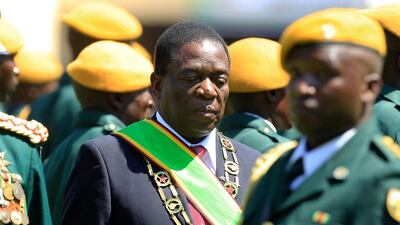“We have at last found a man who can make our small nation a great nation. Please help him.”
So said Rev Andrew Wutawunashe on Sunday, during his official blessing before Emmerson Mnangagwa was sworn in as Zimbabwe’s president for the second time in nine months.
While some 60,000 supporters of the ruling Zanu-PF party attended the inauguration at Harare’s National Sports Stadium, much of the country was subdued after a violent, disputed election that may have crushed Zimbabwe’s hopes of a political and economic renaissance.
The coming months will be instrumental. But Mr Wutawunashe’s remarks on Sunday hint at the tragedy of modern Zimbabwe.
Formerly known as the breadbasket of Africa, Zimbabwe's vast plains once abounded with wheat, cotton, tobacco, sugar cane and maize. It is endowed with a vast bounty of platinum, integral to making smartphones and electric cars. Its population is young, with 62 per cent under the age of 25.
But as former president Robert Mugabe ossified in power over 37 years characterised by famine, corruption and human rights abuses, Zimbabwe’s fortunes faded. Today, more than half its arable land is under-used, inflation exceeds 200 per cent and nine in 10 Zimbabweans lack formal employment. Debts to international lenders total US$5.6 billion (Dh20.6bn), almost a third of which needs to be paid before the country can borrow again.
So when the army toppled Mr Mugabe last November and installed his longtime deputy and henchman, Mr Mnangagwa, there were scenes of jubilation.
The opportunity fell to the new president in July’s elections to break with the mistakes of the past, shed the country’s pariah image and embrace the world.
It was a mammoth task for a man who is himself the target of US sanctions. And that task now looks even greater.
In the aftermath of a tight election marred by allegations of foul play, violence erupted in downtown Harare, an opposition stronghold. A heavy-handed military stepped in, killing six protesters.
It caused many to wonder whether the generals who had risked their lives to install Mr Mnangagwa would have let him lose.
Although an election challenge brought by opposition candidate Nelson Chamisa’s Movement for Democratic Change was rejected by the country’s highest court, a US-Zimbabwean observer mission questioned whether Zimbabwe has “established a tolerant, democratic culture”.
Mr Chamisa – who must now lead an active and constructive opposition – stayed away from Sunday’s inauguration. So too did western leaders and representatives.
During an inauguration ceremony packed with pomp and ritual, Mr Mnangagwa promised a “brighter tomorrow”. But rebooting Zimbabwe’s scarred economy will require him to convince investors and donors that he has ditched the mistakes of the past.
When it comes to judicial and press independence, corruption, the influence of China – by far Mr Mugabe’s biggest investor – and the role of the military, the president has serious work to do.
These challenges are not insurmountable for a leader who impressed investors at Davos in January and witnessed first-hand the destructive Mugabe years.
But after a violent post-election crackdown that drew the eyes of the world, Mr Mnangagwa’s task looks more arduous than ever.

